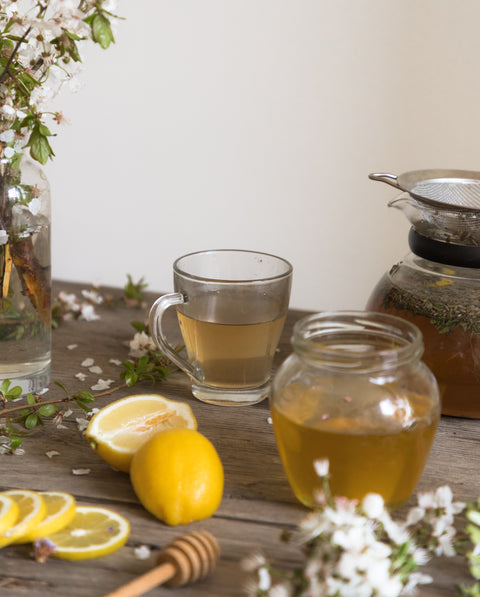If you groan at the coming of spring or fall, you’d probably give anything to learn how to get rid of allergies naturally forever.
Unfortunately, there’s no cure for seasonal allergies (aka allergic rhinitis or hay fever).
As your body jumps into hypersensitive overdrive, common pathogens like pollen from trees, plants, and grass may cause annoying symptoms like sneezing, sinus pressure, congestion, runny nose, itchy eyes, and more.
Over-the-counter (OTC) allergy medications may provide temporary relief. But they also carry side effects like nausea, drowsiness, insomnia, and other unwanted feelings. These can actually make you feel worse than the dreaded spring-forward time change.
That’s why we’re sharing:
The 8 Best Natural Remedies for Seasonal Allergy Relief
There’s no one-size-fits-all approach for how to stop allergies immediately, naturally.
Our list contains natural anti-allergy foods, home remedies that may relieve your worst symptoms, and natural supplements for allergies that scientists are still researching.
Trying one or more of these may be a simple way to spring into better health this season:
1. Steam Inhalation
Ever wonder why a warm shower makes your allergies practically disappear? You can thank steam for that.
Steam opens up your nasal passages and calms down inflamed membranes lining the inside of your nose [*].
If you can’t shower, boil a pot of water on the stove. Once you see the steam rising, cut the heat and lean over the pot with a towel over your head to trap those beneficial vapors. Breathe in the steam for five to 10 minutes.
Inhaling steam from a warm cup of tea as you sip also helps. Studies show the best teas for allergy symptom relief may include [*][*][*]:
- Stinging nettle tea
- Spirulina tea
- Butterbur tea
- Lemon peel tea
- Ginger tea
- Turmeric tea
Drinking warm tea with honey may also soothe a sore throat if you suffer from post-nasal drip.

2. Honey
Researchers are mixed when it comes to honey for allergy relief.
Some believe consuming small amounts of local honey may desensitize your body to the pollen in the air.
Since bees gather the nectar of local flowers to produce honey, eating it may expose your immune system to what triggers your allergy symptoms. Then your body won’t go into attack mode when you encounter that trigger outside.
In one study, patients with a birch pollen allergy who consumed birch pollen honey [*]:
- Lowered their allergy symptoms by 60%
- Had twice as many asymptomatic days
- Scored 70% fewer days with severe symptoms
- Used 50% less antihistamines
On the other hand, scientists who disagree say that most people are allergic to pollen from grasses, trees, and weeds, not flowers. So this may only work if you’re allergic to wildflowers in your area.
We need more research to settle this debate. But this natural sweet remedy is worth a shot.
3. Hot and Cold Compresses
A compress that can be used hot or cold may do wonders for your seasonal allergy symptoms.
Place a cold compress over dry, itchy eyes to keep yourself from rubbing them (which only makes them feel worse). Place a warm compress across your face to relieve sinus pain and pressure.
4. Vitamin D
Several studies suggest that vitamin D deficiency may be linked to seasonal allergies. And people getting adequate amounts of this vitamin may be able to keep those allergies away [*].
Technically, vitamin D isn’t actually a vitamin; it belongs to a family of steroid hormones and helps regulate immune system cells [*].
Scientists discovered that people meeting their recommended vitamin D goals while taking antihistamines or receiving allergy shots improved their symptoms more than participants with lower vitamin D levels [*][*].
You can boost your vitamin D intake by eating eggs, cheese, and fatty fish (such as tuna, salmon, and sardines). Our bodies also convert UV rays from the sun into vitamin D, which is another reason to get outside.

5. Nasal Irrigation (with a Neti Pot, Saline Spray, etc.)
Flushing out your sinuses was considered an “alternative practice” but has since become more mainstream. We added it to our list because most people are still weary of trying it out.
With roots in Ayurvedic medicine, sinus irrigation is one of the best natural remedies for seasonal allergies, sinus congestion, runny noses, and more. People have been using it for hundreds of years!
According to research, this at-home practice has little to no side effects yet [*][*]:
- Improves nasal allergy symptoms
- Reduces allergy medicine consumption
- Speeds up mucus clearing time
- Improves quality of life
You can use an OTC saline rinse or spray, a Neti pot, or a squeeze bottle filled with water to flush out your sinuses. This act washes out pollen, allergens, and other irritants that sneak into your nose. It can also lower inflammation to help you breathe better.
If you’re new to the practice, there are tons of videos online to show you how it’s done. Once you get the hang of it, you can rinse your nasal passage several times a day to find relief.
Just remember to always use sterile, boiled, or distilled water. The fluoride, chlorine, and trace minerals in tap water can irritate your sinuses. Using contaminated tap water for nasal irrigation has also caused fatal infections [*]. Clean your device after each use too.
6. Spirulina
Spirulina is blue-green algae rich in nutrients, protein, vitamins, minerals, and antioxidants [*]. Researchers say spirulina consumption significantly improves allergy symptoms such as runny nose, sneezing, nasal congestion, and itching [*].
Scientists in one study wanted to compare the results between people taking either spirulina or cetirizine (a common OTC antihistamine) for two months. The spirulina group reduced nasal congestion and significantly improved their quality of life scores.
This led researchers to conclude that “spirulina is more effective than cetirizine” for seasonal allergy patients [*].
7. Yoga
You may not be able to fully breathe through every pose. Yet yoga may be just what you need if you suffer from allergic rhinitis.
To test this theory, researchers asked 50 volunteers with seasonal allergies to practice Hatha yoga for three months. At the end of the trial, they learned that yoga helped participants reduce nasal congestion and improve their breathing [*].
Another smaller study prompted participants to practice Hatha yoga for 60 minutes three times a week for eight weeks. That group increased respiratory flow and reduced several allergy symptoms [*].

🧘 Relieve your allergies naturally with these different types of yoga.
8. Nigella Sativa
Nigella Sativa goes by half a dozen names, including black caraway, black seed, and black cumin seed. This annual flowering plant is native to Eastern Europe and Western Asia and typically used as a spice in those regions.
However, scientists say the active chemical compounds in Nigella Sativa oil may help relieve symptoms of seasonal allergies such as nasal congestion, runny nose, itchy nose, and sneezing attacks [*].
Participants in one study were divided into groups based on the severity of their allergy symptoms before taking Nigella Sativa extract. After six weeks of treatment [*]:
- 100% of the patients in the mild symptomatic group became symptom-free.
- 68.7% of those in the moderate group became symptom-free.
- 58.3% of those with the most severe reactions became symptom-free.
Here’s the best part: 92% of all the patients demonstrated improvement in their symptoms or became symptom-free. Over 55% even became more tolerant of their allergy triggers.
You can find black cumin seed oil supplements, or in liquid forms you can smell, use as nasal drops, or rub on your forehead for relief. Studies show no significant side effects.
Say See-Ya! to Sneezing and Hello! to Spring 🌼
The power of natural remedies for seasonal allergies can be incredible. But whether you opt for a nasal rinse, a new supplement, or any other tip on this list, speak with your doctor first to get the green light.
We’re crossing our fingers that one of these options allows you to enjoy everything spring offers and take joy in a happier, healthier you!
Author: Devan Ciccarelli
Email: devan@behappynothangry.com
Instagram/Facebook Group: @behappynothangry/Be Happy Not Hangry
Website: www.behappynothangry.com




